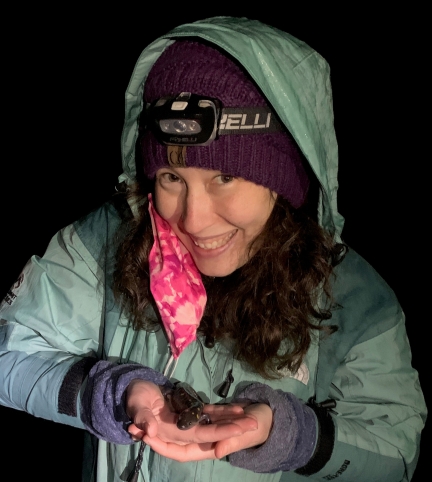Lauren Ash
Visiting Assistant Laboratory Professor of Biology

- Office
- Le Chateau, Room 112
- lash@middlebury.edu
- Office Hours
- Tuesdays 4:30-5:30pm, Wednesdays 11am-noon
Courses Taught
BIOL 0140
Ecology and Evolution
Course Description
Ecology and Evolution
In this introduction to ecology and evolutionary biology we will cover the topics of interspecific interactions (competition, predation, mutualism), demography and life-history patterns, succession and disturbance in natural communities, species diversity, stability and complexity, causes of evolutionary change, speciation, phylogenetic reconstruction, and population genetics. The laboratory component will examine lecture topics in detail (such as measuring the evolutionary response of bacteria, adaptations of stream invertebrates to life in moving water, invasive species and their patterns of spread). We will emphasize experimental design, data collection in the field and in the laboratory, data analysis, and writing skills. This course is not open to seniors and second semester juniors in the Fall. 3 hrs. lect./disc./3 hrs. lab
Terms Taught
Requirements
BIOL 0145
Cell Biology and Genetics
Course Description
Cell Biology and Genetics
In this introduction to modern cellular, genetic, and molecular biology we will explore life science concepts with an emphasis on their integral nature and evolutionary relationships. Topics covered will include cell membrane structure and function, metabolism, cell motility and division, genome structure and replication, the regulation of gene expression and protein production, genotype to phenotype relationship, and basic principles of inheritance. Major concepts will be illustrated using a broad range of examples from plants, animals, and microorganisms. Current topics in biology will be integrated into the course as they arise. 3 hrs. lect./3 hrs. lab
Terms Taught
Requirements
BIOL 1007
Reproducible Biology in R
Course Description
Reproducible Biology in R
Reproducibility is essential at all stages of research and allows for the validation and replication of science, enhancing collaborations and connectivity. The open-source nature of R programming and its ability to analyze and visualize datasets make it a powerful tool in biology. In this course, we will learn the basics of reproducible coding in R and RStudio (no prior knowledge required). Primarily, we will cover: 1) Data structures and creating publication-quality figures; 2) How to ask and answer scientific questions using basic statistics; 3) Creating shareable documents using Rmarkdown; and 4) Reproducibility using GitHub, shell commands, and LaTeX - all within RStudio. Each week will involve a combination of structured lecture, group work, and coding exercises. (Requires BIOL 140 or BIOL 145).
Terms Taught
Requirements
